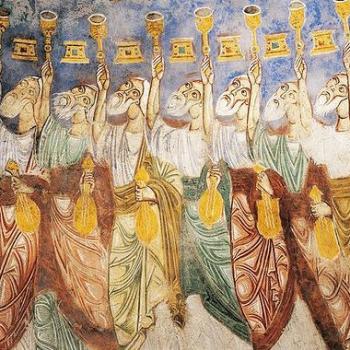*The opinions expressed here are my own (or those of the guest writer); I do not speak for any other person, group or organization; nor do I imply that the opinions expressed here reflect those of any other person, group or organization unless I say so specifically. Before commenting read the entire post and the “Note to commenters” at its end. If your comment violates the rules stated there, it will probably not be posted here.*
*First read my first six posts in this series; they immediately precede this blog post. They set forth my fundamental “principles” for living and thinking.
*Now begins a second part of this series; this series is about my reasons for being a Christian and for embracing a particular “brand” of Christianity called (as in the name of this blog) “evangelical Arminianism.”
7) My First Reason for Embracing “Evangelical, Arminian Christianity”: Christianity
The very idea of “reason for” is multidimensional and ambiguous. Perhaps two dimensions come into play: descriptive and prescriptive. When I say that I am going to deliver my “reason for” embracing Christianity I might mean mere description which would involve telling how I came to embrace Christianity. On the other hand, I might mean prescription which would involve explaining why I continue to embrace Christianity—beyond mere “telling my story.” Inquiring minds are more likely to be interested in the prescription than the description. However, part of being Christian includes telling one’s story of “acquisition of faith” in Jesus Christ as the supreme revelation of ultimate reality, of God. A person who can only say “I inherited my Christian faith” is unlikely to be taken seriously as authentically Christian by other Christians. That would be considered at best “nominal” (in name only) Christianity. All branches of Christianity believe and teach that, while a person may very well be “born into” Christianity, insofar as he or she matures he or she must somehow or other decide to be Christian. Such decision does not have to be explicit or dramatic; for most Christians it very well may be a subtle process. But most, if not all, branches of Christianity have something like “conversion” or “confirmation” or both. It’s complicated and diverse, but my point is simply that most Christians expect a mature Christian to be able to give some account of either becoming or choosing to remain Christian.
So first I will offer my description which many Christians will call “testimony.” I was born into a passionately Christian family; for all branches of my family (I have three because my mother died when I was a child and I was raised by a stepmother) Christianity was counter-cultural. They believed that being a Christian was more than just being a citizen of a “Christian country.” At a very young age, probably around seven or eight, I decided to embrace my family’s Christian faith by means of a “personal decision of faith in Jesus Christ as my Lord and Savior.” I was then baptized and became a member of our Christian church. I then grew up in Christianity, was spiritually formed in the “bosom” of evangelical Christianity (something I will explain later in this series), was educated in it, and have remained Christian throughout my life, never rejected it or even seriously doubting it. At various times and in various places I have had experiences that one might call “mystical” or “ecstatic” that reinforced my belief in and commitment to Christianity. I have had “epiphanies” that convinced me that “the way of Jesus Christ” is true. That is my description of “the reason for my embrace of Christianity.”
However, as I matured in my Christian faith and encountered alternative belief systems, worldviews (both among Christians and of other persons and organizations) I came to question whether what I was believing as a Christian is true. I became an “inquiring mind” and, in the inimitable words of one of my mentors, “continued to believe what I questioned even as I questioned what I believed.” This process, with all its ups and downs, never caused me to depart from my Christian faith or Christian communities. However, it did include “moments” of distancing, periods of “stepping aside” from the passion of faith commitment to examine what I had always believed. I became convinced that “Just as the unexamined life is not worth living, so the unexamined faith is not worth believing.” I wanted to know whether the revelation I accepted by faith was also reasonable in an intersubjective way.
Aside: Some people will assume, even argue, that believing the belief system within which one was born is a strike against its truth. That has never made any sense to me. Truth is a separate issue from the descriptive account of why one believes. On the other hand, I agree that it is worthwhile to question whether there are reasons to continue believing in the religion or quasi-religion of one’s birth.
After Bible college and seminary I decided it would be best for me to pursue further religious studies in a secular and pluralistic learning environment, so I enrolled in a major, national research university’s Ph.D. program in religious studies. It always has been unaffiliated with any religion; it was founded to be secular and remains so. (Perhaps “pluralistic” is a better description than “secular.”) I wanted to be tested as to the soundness of my reasons for continuing to embrace the faith tradition into which I was born. There I studied religion and philosophy with a wide variety of professors and students. I read books by atheists, Buddhists, Muslims, secular humanists, etc. I even taught a mini-course on Islam. I attended lectures by visiting Muslims, secular humanists, and was taught by Christians from a variety of traditions—Eastern Orthodox, Unitarian, Roman Catholic, Baptist and Methodist. I stepped outside the cozy confines of the Religious Studies Department to take classes in the thoroughly secular Philosophy Department. And I ministered in a “flavor” of Christianity extremely different from that into which I was born and in which I was raised: “mainline, liberal Protestant.”
There, in that new context of university and church, I was forced to deeply examine and consider the reasonableness of what I believed as a Christian. For the first time in my life I was not surrounded by Christians. (I attended public schools from Kindergarten through high school but cannot say they were very secular; Christianity, broadly understood, was part of their “culture.” However, my closest school friend, with whom I sat in “Home Room” and “Study Hall” daily for three years, was a committed and very intelligent atheist. Through him I came to know about and read Sartre and Camus.) Even the church where I ministered included people I would not consider more than nominal in their Christianity. (One elder told me he was more committed to Masonry than to Christianity.)
Through all this peripatetic examining of the reasonableness of my Christian faith I was fortunate enough (I believe it was God’s grace) to come into contact with very intelligent, thoughtful and reasonable Christian intellectuals. I spent time with Malcolm Muggeridge, Hans Küng, Wolfhart Pannenberg, Dietrich Ritschl, to name only a few of them. I read deeply in C. S. Lewis and even taught an undergraduate course (in my secular university during my Ph.D. studies) about Lewis. I also taught an undergraduate course in “Deity, Mysticism and the Occult” which included “close encounters” with a wide variety of alternative worldviews and belief systems including neo-paganism, Zen Buddhism, Sufi Islam, and the then very popular Hare Krishna movement.
All that is simply to say that my Christianity has been challenged and supported. It has been “through the mill” and even the “fire,” and has not been some cozy cocoon of unreflective folk religion (as many might wrongly assume). And yet, in spite of all the challenges, in spite of all the questioning, in spite of all the critical examination, I have never found any good reason to abandon it. It has evolved in my understanding, of course, but I have never encountered what I consider a defeating argument or experience and I have never encountered an alternative life and worldview, religious or secular, that seemed to me more coherent and experientially fruitful.
If I am asked why I am a Christian, and the question is meant prescriptively, I would have to say with C. S. Lewis that, even though I cannot “see” God (as understood by Christianity) I see everything, all of life, in his light—in the light of his reality. And when I have attempted to “bracket out” my Christian life and worldview and “try on” alternative ones, all has become dark. Lewis used the analogy, of course, of not being able actually to “see” the sun in the sense of looking straight into it, and yet believing in it because he saw everything by its light. So my Christian life and worldview, based on the revelation of ultimate reality contained in the biblical narrative that centers around the person of Jesus Christ as God incarnate, is, I find, the most coherent and experientially illuminating life and worldview.
That does not amount to proof, but when I study alternative life and worldviews I find them all falling short—both in terms of explaining my life experiences and being coherent. That does not mean that I find no truth in them; studying some of them has been extremely helpful to me. I find truth in most of them, but I attribute that to the “Logos,” the divine Word, the “world reason” who was and is God in human flesh.
In the end, however, I know that I am a Christian because I can’t help it. I can’t help it because the God of Jesus Christ has intervened in my life numerous times and I find myself elevated in communion with him. I experience myself as exactly what Christian Scripture says I am: a sinner dependent on God’s grace through Jesus Christ for my security in life and hope in death.
*Note to commenters: This blog is not a discussion board; please respond with a question or comment solely to me (or the guest writer). If you do not share my evangelical Christian perspective, feel free to ask a question for clarification, but know that this is not a space for debating incommensurate perspectives/worldviews. In any case, know that there is no guarantee that your question or comment will be posted by the moderator or answered by the writer. If you hope for your question or comment to appear here and be answered or responded to, make sure it is civil, respectful, and “on topic.” Do not comment if you have not read the entire post and do not misrepresent what it says. Keep any comment (including questions) to minimal length; do not post essays, sermons or testimonies here. This is a space for expressions of the blogger’s (or guest writers’) opinions and constructive dialogue among especially evangelical Christians.














